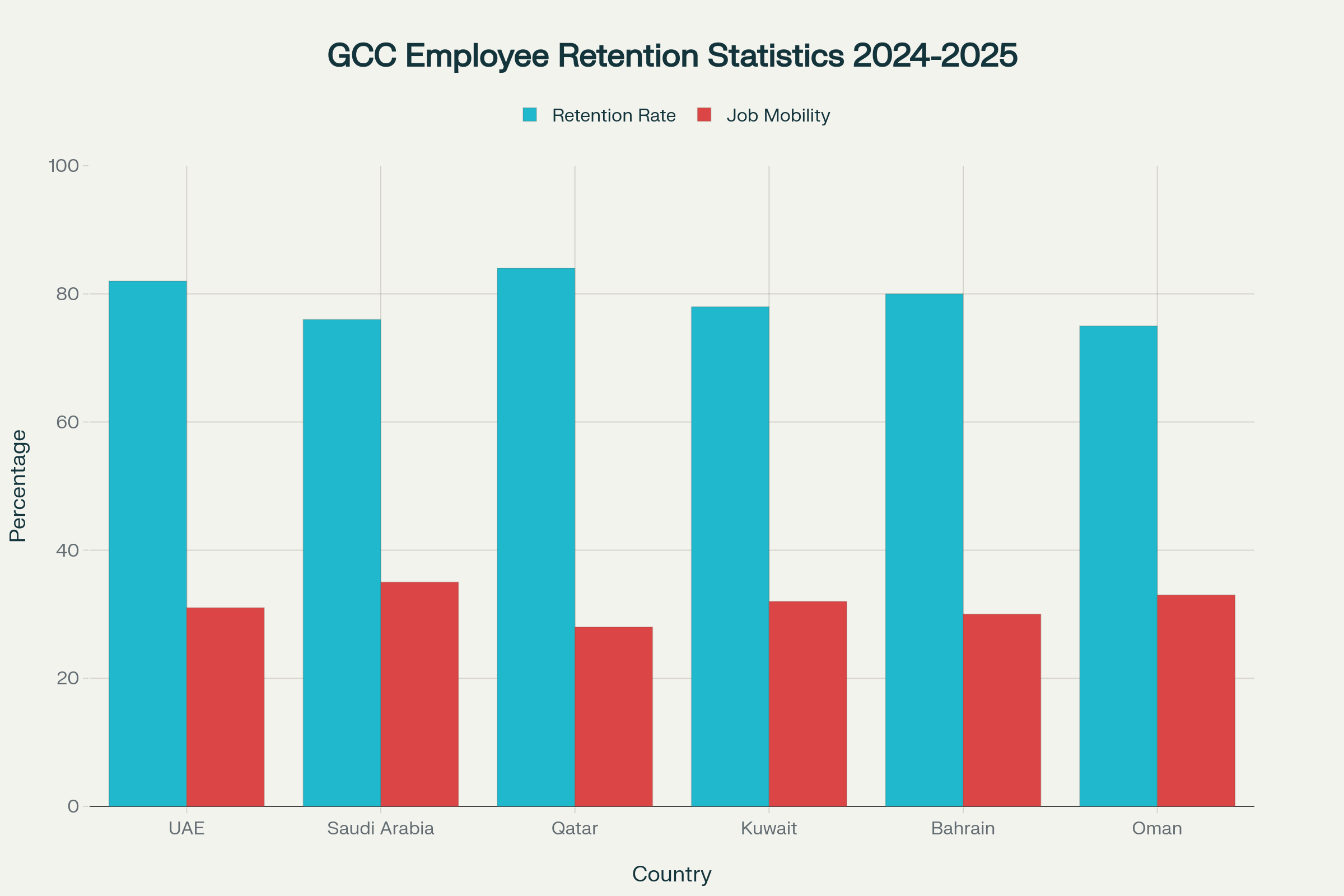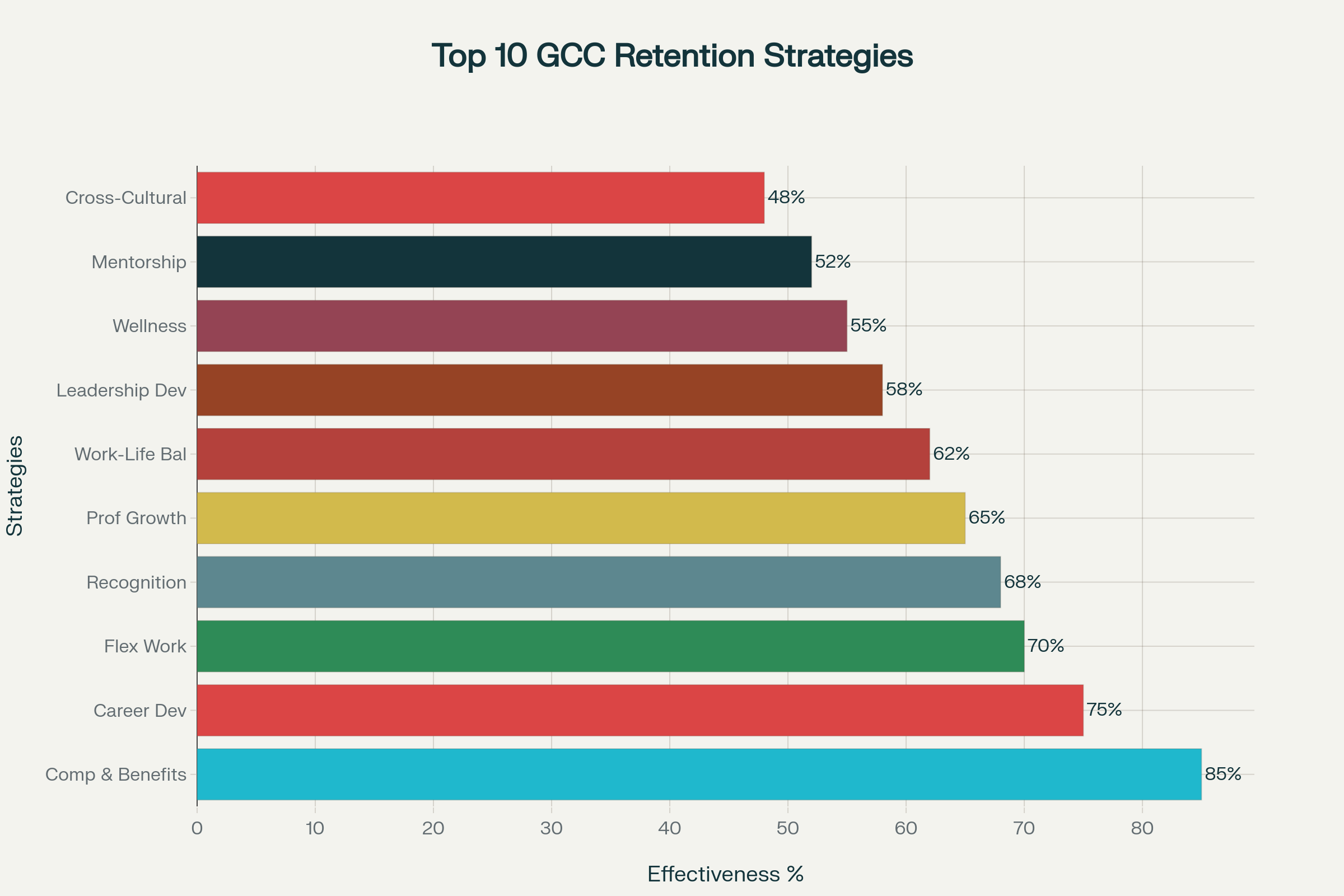The Gulf Cooperation Council (GCC) region faces one of the most significant talent retention challenges globally, with 51% of companies identifying employee retention as their primary concern. In a competitive landscape where skilled professionals command premium salaries and have abundant opportunities across multiple markets, traditional retention approaches are proving insufficient. This comprehensive analysis reveals the most effective, data-driven strategies that leading GCC organizations are successfully implementing to build loyal, engaged workforces that drive long-term business success.economictimes+2
Understanding the GCC Talent Retention Crisis
The Scale of the Challenge
The talent retention crisis in the GCC is both widespread and costly. Recent data reveals alarming statistics that underscore the urgency of implementing effective retention strategies:economictimes+1
- 31% of GCC professionals actively plan to change jobs within the next year
- 52% of the workforce remains open to new opportunities, signaling high talent mobility
- Average turnover rates range from 25% to 35% across different sectors, with hospitality and retail experiencing the highest churn
- The cost of replacing a departing employee can reach twice their annual salary when factoring in recruitment, training, and lost productivitygulfnews

Employee retention rates and job mobility statistics across GCC countries in 2024-2025
Regional Variations and Unique Challenges
Each GCC country presents distinct retention challenges shaped by local economic policies, cultural factors, and market dynamics:naturalspublishing+1
Saudi Arabia leads in both recruitment growth and talent turnover, driven by Vision 2030 initiatives and Saudization requirements. The Kingdom shows a 658.7% increase in private sector employment for GCC nationals since 2007, yet maintains the highest job mobility rates at 35%.peoplestrong
United Arab Emirates demonstrates strong retention capabilities with an 82% retention rate, but faces challenges from the Green Visa initiative that enables greater job mobility. The UAE’s diverse workforce composition requires sophisticated retention strategies addressing both expatriate and local talent needs.peoplestrong+1
Qatar achieves the highest retention rate at 84% among GCC countries, primarily due to strategic investments in employee development and competitive compensation packages.inductusgcc+1
Core Drivers of Talent Retention in the GCC
Financial Compensation and Benefits
Competitive compensation remains the most effective retention strategy, with 85% effectiveness in keeping top talent. Leading GCC organizations are implementing comprehensive approaches:linkedin
Salary Benchmarking and Market Alignment: Companies are conducting regular salary reviews to ensure competitiveness. GCC organizations provided an average 6.7% salary increase in 2023, with some sectors offering 8-12% hikes for specialized roles.peoplestrong+1
Long-Term Incentives: 71% of successful GCC companies now offer long-term incentives including Employee Stock Options (ESOPs), Restricted Stock Units (RSUs), and Stock Appreciation Rights (SARs) to build employee loyalty.thehindubusinessline
Comprehensive Benefits Packages: 83% of GCC organizations provide private medical insurance, while 55% offer flexible working arrangements as core benefits. Additional perks include housing allowances, education subsidies, and wellness programs tailored to regional expectations.skillscaravan+1
Career Development and Growth Opportunities
Career development programs rank as the second most effective retention strategy with 75% success rates.

Top 10 most effective talent retention strategies used by GCC companies and their success rates
Progressive GCC companies are implementing:
Structured Career Pathways: Clear progression frameworks with defined milestones and transparent promotion criteria. Companies are creating internal mobility programs allowing employees to explore different roles within the organization.ensaantech
Continuous Learning Initiatives: Investment in upskilling programs focusing on emerging technologies like AI, machine learning, and cybersecurity. 92% of training support in leading GCC companies targets new market entrants and skill development.mckinsey
Leadership Development: Mentorship programs and leadership training specifically designed to address the multigenerational workforce needs in the region.pro-capita+1
Work-Life Balance and Flexibility
The modern GCC workforce increasingly values flexibility, with 70% effectiveness in retention when properly implemented. Successful strategies include:
Hybrid Work Models: Offering remote and flexible work options for suitable roles, with 88% of employees considering flexible schedules essential.ensaantech
Cultural Accommodation: Respecting local customs including prayer times, religious observances, and family commitments, particularly important in Saudi Arabia and other conservative markets.pro-capita
Wellness Programs: Comprehensive health and wellness initiatives addressing the demanding work environment typical in GCC countries.naturalspublishing
Industry-Specific Retention Strategies
Technology and Innovation Sectors
GCC technology companies face unique retention challenges due to high demand for specialized skills:
Premium Compensation for AI/ML Roles: Specialized positions command 35-55% salary premiums during job transitions. Companies are offering competitive packages for roles in data engineering, cybersecurity, and cloud development.allthingstalent
Innovation Culture: Creating environments that foster creativity and technological advancement, allowing employees to work with cutting-edge technologies.zimyo+1
Global Exposure: Providing opportunities to work on international projects and collaborate with global teams, particularly attractive to younger professionals seeking diverse experiences.peoplestrong
Traditional Industries Adapting to Modern Expectations
Retail and Hospitality: Implementing Saudization strategies with 70% minimum nationalization rates while maintaining service quality through comprehensive training programs.menaexecutives
Financial Services: Focusing on digital transformation training and providing clear pathways for local talent to advance into senior positions.zinnov
Energy and Utilities: Developing behavioral change programs that transform organizational culture from top to bottom, as demonstrated by successful utility companies achieving significant improvements in retention rates.dubaieye1038
Cultural and Regulatory Considerations
Navigating Nationalization Policies
Saudization and Emiratization requirements significantly impact retention strategies:
Targeted Development Programs: Companies like Al Othaim Markets increased Saudi employment from 30% to 65% through tailored training pathways and partnerships with local educational institutions.menaexecutives
Cultural Integration: Successful programs focus on genuine career opportunities rather than quota compliance, with companies like Panda Retail transitioning 200+ Saudi employees from entry-level to management positions.menaexecutives
Compliance and Documentation: Maintaining comprehensive systems for tracking nationalization progress while ensuring equal development opportunities for all employees.linkedin
Addressing Multicultural Workforce Needs
The GCC’s diverse workforce requires sophisticated retention approaches:
Inclusive Leadership: Training managers to navigate cultural nuances and connect team members from diverse backgrounds effectively.naturalspublishing+1
Cross-Cultural Recognition: Implementing recognition programs that respect different cultural values and traditions while promoting unified organizational objectives.kornferry
Language and Communication: Providing multilingual support and ensuring clear communication across different cultural groups.skillscaravan
Technology-Enabled Retention Solutions
AI and Analytics in Talent Management
Leading GCC organizations are leveraging technology to enhance retention:
Predictive Analytics: Using data to anticipate workforce trends, skills gaps, and employee behaviors, enabling proactive intervention.consultancy-me
Personalized Development: AI-driven systems that create individualized learning paths and career development recommendations based on employee preferences and performance.zinnov
Real-Time Feedback Systems: Implementing digital platforms that facilitate continuous feedback and recognition.gulfcareers
Digital Engagement Platforms
Employee Self-Service Systems: 40% reduction in HR administrative workload through mobile-first platforms allowing employees to manage routine tasks independently.peoplehum
Gamified Learning: Interactive training applications that make skill development engaging while providing detailed analytics on competency development.menaexecutives
Communication Tools: Advanced internal communication platforms ensuring transparent, two-way dialogue between management and employees.weforum
Measuring and Optimizing Retention Efforts
Key Performance Indicators
Successful GCC organizations track comprehensive metrics:
Retention Rates by Function: Monitoring turnover across different departments, with particular attention to high-risk areas like product development (55% mobility) and IT (45% mobility).rfsonshr
Employee Engagement Scores: Regular pulse surveys measuring satisfaction, commitment, and likelihood to recommend the organization.linkedin
Cost of Turnover: Calculating the total cost of employee departures including recruitment, training, and productivity losses.gulfnews
Continuous Improvement Strategies
Regular Strategy Review: Adapting retention programs based on feedback and changing market conditions.gulfcareers+1
Benchmarking: Comparing retention rates and strategies against industry leaders and regional competitors.odgers
Employee Voice Programs: Creating channels for employees to influence retention strategies and organizational policies.rchilli
Future-Proofing Retention Strategies
Emerging Trends and Adaptations
The GCC talent landscape continues evolving, requiring adaptive retention approaches:
Generational Preferences: Addressing the needs of Gen Z employees who prioritize purpose-driven work, flexibility, and continuous learning opportunities.peoplestrong+1
ESG Integration: Incorporating Environmental, Social, and Governance considerations into retention strategies to attract socially conscious talent.consultancy-me
Remote Work Evolution: Adapting to permanent changes in work preferences while maintaining cultural cohesion and productivity.chronus
Strategic Recommendations for 2025 and Beyond
Holistic Employee Experience: Moving beyond transactional approaches to create comprehensive employee experiences that address career, personal, and cultural needs.nasstalent+1
Investment in Local Talent: Strengthening partnerships with educational institutions and developing robust pipeline programs for local talent development.mckinsey
Agile Retention Frameworks: Building flexible retention strategies that can quickly adapt to changing economic conditions and employee expectations.thehindubusinessline
Conclusion
Successful talent retention in the GCC requires a sophisticated, multi-faceted approach that addresses the region’s unique challenges while embracing global best practices. Organizations that combine competitive compensation with meaningful career development, cultural sensitivity, and technological innovation achieve the highest retention rates. The most effective strategies integrate financial incentives with purpose-driven work environments, flexible arrangements, and clear growth pathways.
As the GCC continues its economic diversification and digital transformation, companies that invest in comprehensive, employee-centric retention strategies will build the stable, engaged workforces necessary for long-term success. The evidence clearly demonstrates that retention is not just an HR challenge—it’s a strategic imperative that directly impacts organizational performance, innovation capacity, and competitive advantage in the rapidly evolving Middle Eastern business landscape.
The path forward requires sustained commitment to understanding and addressing employee needs, continuous adaptation to changing market conditions, and integration of retention strategies into broader business objectives. Organizations that master these elements will not only retain top talent but also create sustainable competitive advantages in one of the world’s most dynamic economic regions.






